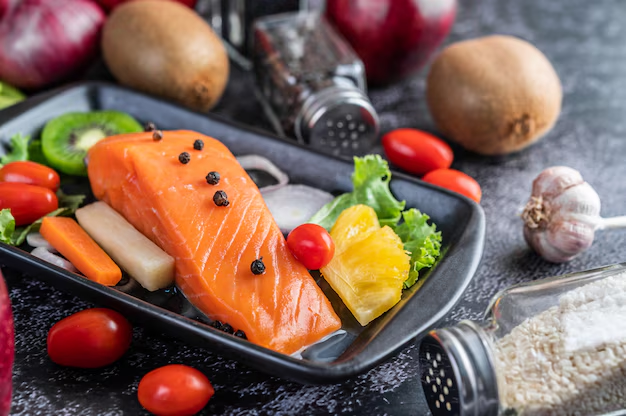Discover How Long Salmon Stays Fresh in Your Refrigerator
Salmon is a beloved seafood choice for many, offering versatility, rich flavor, and numerous health benefits. However, understanding how long salmon can stay fresh in your refrigerator is crucial to ensuring both safety and taste. Whether you're preparing a delicious salmon dish or storing leftovers, knowing the best practices for salmon storage can make a significant difference.
🐟 How Fresh Is Your Salmon? Factors to Consider
Before diving into storage specifics, it's essential to recognize that the freshness of salmon can depend on several factors:
- Type of Salmon: Wild-caught vs. farmed, fresh vs. smoked—each type has different storage needs.
- Purchase Source: Was your salmon bought fresh from a market or pre-packaged from a supermarket?
- Storage Conditions: How quickly it was refrigerated after buying, and the temperature consistency of your refrigerator.
Evaluating Freshness on Purchase
When buying salmon, ensure it has:
- A bright color, either vibrant pink or deep red, depending on the type.
- A firm texture with no mushiness when pressed.
- A clean, ocean-like smell; any strong fishy smell indicates it may not be fresh.
🕒 How Long Does Fresh Salmon Last in the Fridge?
Generally, fresh salmon will remain safe to eat in your refrigerator for about 1 to 2 days. This brief timeframe emphasizes how crucial it is to plan your meals accordingly and be prepared to cook salmon soon after purchasing.
Storing Tips for Maximizing Freshness
- Refrigerate Quickly: Store salmon immediately upon purchasing. If not possible, keep it in a cooler with ice packs until you reach home.
- Optimal Temperature: Maintain your refrigerator at 32°F to 38°F.
- Seal Properly: Keep the salmon in its original packaging if vacuum-sealed, or wrap with plastic wrap and place in an airtight container.
- Keep Away from Air: Limit exposure to air, which can speed up spoilage.
Smoked Salmon: A Different Timeline
Smoked salmon has a longer shelf life compared to fresh salmon. When unopened, it can last up to 2 weeks in the fridge. Once opened, however, aim to consume within a week for optimal quality and safety.
Why Does Smoked Salmon Last Longer?
The smoking process involves curing the fish with salt, sometimes with added preservatives, which significantly extends its longevity by reducing moisture and potential bacterial growth.
🍣 Freezing Salmon for Extended Storage
If you cannot consume your salmon within the recommended timeframe, freezing is an excellent option. Properly stored frozen salmon can last up to 3 months without losing quality.
Freezing Best Practices
- Pre-Freeze Prep: Rinse with cold water and pat dry.
- Packing Methods: Use a vacuum sealer or a tightly sealed freezer-safe bag.
- Label and Date: Always label with the date before freezing to keep track of its shelf life.
- Thawing Tips: Thaw in the refrigerator overnight rather than at room temperature to maintain texture and flavor.
Signs Your Salmon Has Spoiled
Understanding spoilage signs helps prevent the risk of foodborne illness. Do not consume salmon if you notice:
- Discoloration: A dull or grayish hue.
- Texture Changes: Excessive slime or flaky to touch.
- Odor: A strong, sour, or ammonia-like smell.
Practical Consumer Summary 📝
The following quick tips will help ensure your salmon stays fresh and delicious:
- Buy Fresh: Select salmon with vibrant color and a clean smell.
- Store Quick: Refrigerate immediately; use within 1-2 days if fresh.
- Seal Tight: Minimize air exposure with proper sealing.
- Freeze Smart: For longer storage, freeze airtight, with a three-month limit.
- Watch for Signs: Discard if texture, color, or smell is off.
Culinary Techniques for Enjoying Salmon
To fully enjoy your salmon, consider these cooking methods:
- Grilling: Enhances its natural flavors with a smoky touch.
- Baking: Keeps it moist, especially when sealed in foil with vegetables.
- Poaching: Offers a gentle method that preserves tenderness and juiciness.
- Pan-Searing: Results in a crispy skin, contrasting well with its tender interior.
Understanding Shelf Life Beyond Salmon
In a broader sense, comprehending the shelf life of food is essential for health and enjoyment. Storage practices can vary between different food categories:
- Meats: Beef, chicken, and pork each have specific refrigeration and freezing guidelines.
- Produce: Fruits and vegetables offer longer life when stored in specific conditions (e.g., apples in crisper).
- Dairy: Milk, cheese, and yogurt require consistent cold storage to maintain safety.
When in Doubt, Throw It Out
A golden rule for all food storage is erring on the side of caution. With salmon and other perishable foods, consuming them within the recommended window can provide peace of mind and preserve delightful dining experiences.
By mastering the art of seafood storage, you're not only protecting your health but also enhancing the flavor profiles in your culinary repertoire. Enjoy fresh salmon confidently and explore the spectrum of flavors it can offer your kitchen!

